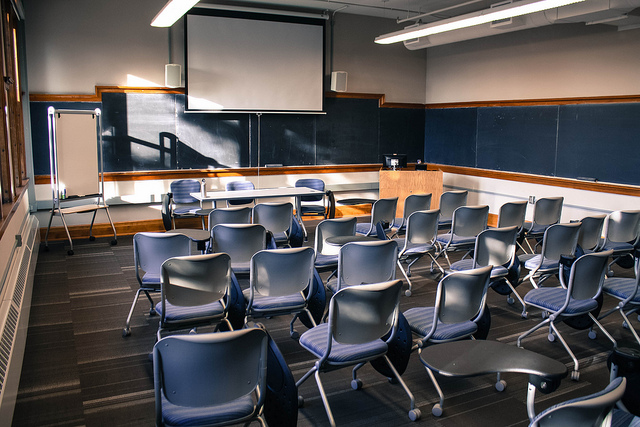A Latino’s Reality in an Elite College Classroom

*I want to introduce you to our newest contributor, Raúl Guzmán Ayala, a first generation student at Carleton College. He writes about his experiences as a Latino in an elite college, and the challenges of living his non-majority reality. Give him a read. VL
By Raúl Guzmán Ayala, Guzmán Weekly
I came across an article on Twitter today that reaffirmed my observations about the exclusionary nature of US society. The title of the article, by Market Watch, is “Why the American Dream is unraveling, in 4 charts”, which I have linked below. This article is about the shockingly disparate advantages associated with one’s socioeconomic status; higher achieving poor kids have lower chances of succeeding in US society than lower achieving wealthy kids. This was shocking to me because not only do the disadvantages associated with being a low-income minority in the US affect one’s chances at success, the article also shows how these disadvantages influence one’s health. I believe the effects of white supremacy have infiltrated even the most personal aspects of our lives. I also thought about a classroom encounter not too long ago.
As a first generation Latino college student at Carleton College from the south side of Chicago, I exist in a very different reality than majority culture members here. The aversive social tendencies present on campus and the difficulty majority as well as non-majority culture students experience when discussing are the most apparent examples. I realized my reality is different than most students at Carleton College during an introductory English rhetoric course my freshman year. We were discussing an excerpt from Richard Rodriguez’s Hunger of Memory. One student mentioned how she couldn’t understand why Richard had such a hard time getting along with his parents as he advanced his education. I responded to her saying that we are in no position to blame Richard; he exists in a completely different world than his parents.
To elaborate on my response to her, I shared a conversation I had with my father, a humble rancher in Mexico, a few nights before: he had lost a cow in the cliffs for more than a week. I then compared it to the conversation my roommate had with his father, a lawyer, the night before: they were going over his economics paper. Clearly, there is a stark contrast between the content and participants of these conversations. Not only do my old roommate and his father speak English, his father has a professional degree and is readily available to help him with his papers if need be. I, much like Richard Rodriguez, do not have that option; my academic life is completely distinct and separated from my home life. From Richard’s experience, I drew an implication similar to what one of my uncles once told me: “Quiciera ayudar a mis hijos con sus tareas, pero despues de cierto nivel, ya no pude”. My uncle explained to me what many times is true between the conversations I have with my parents about school: they simply lack the academic experience necessary to engage with me about my academic life. I have to make an active effort to find the best way to navigate and exist within my home life and school life, while most students’ parents at Carleton College are behind their education every step of the way. I am not saying my perspective is unattainable, but rather the perspective I have (which contains many parallels with other first generation students at Carleton College) is among a miniscule percentage of students. Therefore, I am not surprised that this fact is often overlooked or not acknowledged by majority culture students.
So what do we do now? We must always ask the right questions. Asking the right questions is necessary to get to know others’ experiences and perspectives and it takes the conversation to the next level. Meaningful questions spark skepticism about the exclusionary, racism founded, capitalist system that is the United States. The fact of the matter is that racism is persistent and present in all aspects of society and individual life. We need to ask questions to increase our consciousness and begin to dismantle the disturbing system of advantages in the US. Although the breakdown of racism (including sexism, genderism, ableism, and others) is a constant, corrective process, it is a very realistic goal. Whether most majority culture members are aware or not, racism is ingrained in their psychology, as it is with non-majority culture members. I do not know whether the solution to this problem needs to come from the ground up or from the top down, but I am confident that correcting even one micro-aggressive or hurtful tendency a day is enough to give the social equality movement in the US the necessary momentum for true progress. We are all learners. We have all been wrong; one can never learn if one is never wrong.
So, please check out the article I read:
http://www.marketwatch.com/story/why-the-american-dream-is-unraveling-in-4-charts-2015-03-18?page=2
This article was originally published in Guzmán Weekly.
Raul is the son of Mexican immigrant parents. He was born and raised in Chicago’s south side, and continues to live there today. Growing up in a Spanish-speaking Mexican household and navigating through US society has given him a trans-cultural perspective, so he wants to communicate his observations. He is a first generation student at Carleton College, double majoring in Cinema and Media Studies and Spanish. He has a passion for social equality and racial justice. His hobbies/interests include cinematography, poetry, social activism, Latin American Politics, reading and blogging.
[Photo by Derek Bruff/Flickr]
